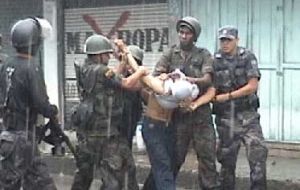MercoPress. South Atlantic News Agency
South America: highest robbery rates
 Rich countries are not exempt
Rich countries are not exempt Fear of crime is driving investment away from cities in developing countries, where over half of all urban residents have been victims in the last five years, a United Nations report warned yesterday.
About 60 percent of urban dwellers in developing countries have been targeted, and more than half of urban dwellers in both rich and poor countries worry about crime "all the time" or "very often," said the U.N. agency for human settlement, known as Habitat. Crime is worst in Latin America and Africa, where some areas had rates affecting 70 percent of city residents, Habitat said. The world's highest robbery rates are in South America, whose largest city, Sao Paulo, was singled out for having 1 percent of the planet's homicides even though the 18 million residents make up just 0.17 percent of the global population, according to Habitat's report on urban safety and security. "Urban violence and crime are increasing worldwide, giving rise to widespread fear and driving away investment in many cities," the U.N.'s chief Ban Ki-moon said in the introduction. While Brazil's economy is booming and Sao Paulo benefits as the nation's financial and industrial center, the city last year saw attacks on authorities by prison-based gangs that killed more than 200 people. The only beneficiary was Brazil's security industry. Brazil already had 35,000 bulletproof cars, and the Sao Paulo attacks led to a 33 percent increase in sales of bulletproof windows, the report said. The nation of nearly 190 million has 1.5 million people employed by security companies, most in Sao Paulo and Rio, which suffers near-constant warfare between police and slum-based gangs. The report said that, while terrorism caused less damage than other types of crimes, it worsened their effects by encouraging the growth of high security enclaves with private guards, frightening away investors and increasing fear. The report said new policies are needed to tackle rapid urbanization. Over half of the world's people already live in urban centers, one billion of them in slums. By 2050, two-thirds of humanity will live in towns and cities. Ban warned that riots in Paris and terrorist attacks in London and Madrid showed that rich countries were not exempt. He said poverty, insecurity of land holdings, social exclusion, poor planning and corruption contributed to crime. Crime hurts the poor most, the report said. "Urban violence erodes the social capital of the poor," said Anna Tibaijuka, the executive director of Habitat. Crime "breaks down socio-cultural bonds and prevents social mobility, thus contributing to the development or urban ghettoes," she said. In Latin America, where 80 percent of the population is urban, half the crime in Brazil, Mexico and Venezuela happens in the cities of Rio de Janeiro, Sao Paulo, Mexico City and Caracas, even as cities in North America and Western Europe registered a decline. Making matters worse, at least 2 million of the world's 1 billion slum dwellers are evicted annually because of gentrification, infrastructure development and urban renewal projects, the report said. "Evictions invariably increase, rather than reduce, the problems that they aim to solve," Tibaijuka said. Basically, we are looking at a world where the equivalent of the entire population of Nairobi or Budapest is moved without consent, forced out of their homes and given no alternative every year," she said.




Top Comments
Disclaimer & comment rulesCommenting for this story is now closed.
If you have a Facebook account, become a fan and comment on our Facebook Page!